Campaign Reaches Target to Judicial Review Integrated Care Board
Parent carers in Bristol have reached a fundraising target to bring legal action against local health boards for what they are calling ‘harmful changes’ to the autism diagnostic process in the city.
Families say they will bring Judicial Review action against Integrated Care Boards who have implemented restrictive criteria for children and young people accessing autism assessments in the city.
The Assess for Autism campaign, has reached its initial target of £3,000 from supporters across the country, pledging money to support action against the Integrated Care Board (ICB) of Bristol, North Somerset and South Gloucestershire.
This will mean the group will now be able to work with Rook Irwin Sweeney LLP, who will look at the merits of challenging the new criteria as well as sending pre-action correspondence to the ICB.
Upset and concern was raised by families in the three local authorities after new criteria was implemented at the beginning of March by Sirona Health and Care, meaning that only children and young people at crisis point would be allowed a referral for an autism assessment.
‘As parents and carers of children with autism, we know first hand the immense struggles families face in accessing the support their children need. The changes made by the ICB will only exacerbate these difficulties, leaving many vulnerable children and young people without the care and assistance they require,’ campaigners say.
The Integrated Care Boards are a new organisational structure responsible for the running of the NHS. The local one was legally established in July 2022 and saw the abolishment of Clinical Commissioning Groups.
The new NHS Bristol, North Somerset and South Gloucestershire ICB will arrange the provision of services and manage the NHS budget in these counties.
The ICB area has been broken down into six locality partnerships to work at a local level – South Gloucestershire, North and West Bristol, Inner City and East Bristol, South Bristol, Woodspring and Weston, Worle and Villages.
The ICB is governed by a board who are accountable for performance and spend.
Questions are now been asked to find out how much Bristol City Council knew about the ICB autism changes and how the LA would be dealing with the impact on education and social care.
Part of an email from Bristol City Council’s Director of Education – Reena Bhogal-Welsh was shared on Twitter this week by Bristol Send campaigner Sally Kent.
The email said: ‘ Dear colleagues As you will be aware Sirona announced changes to their autism assessment and diagnosis processes. Due to the increases in pressures and demands on the assessment and diagnosis processes it became clear that the system was no longer able to meet demand. Following a consultation process with parents/carers, Sirona announced its needs-led assessment process. The Local Authority were not included in the consultation process, but we are in agreement that a needs-led assessment process will ensure more families and young people can access resources to support their experience. Sirona have stated that there is still a place for a diagnosis but this should not be the only way to access the resources available.’
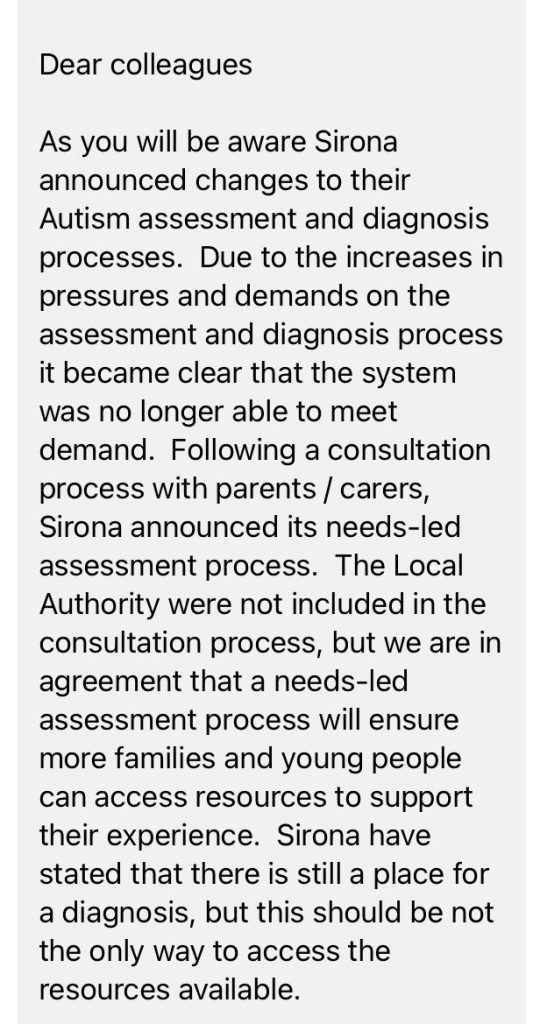
Kent, unimpressed with the answer further blasted the ‘consultation’ with parents as a ‘lie’.
The ICB’s full structure can be seen on their website, which includes Chief Executive of Bristol City Council – Stephen Peacock.
But despite Bristol having its Chief Executive Officer as a Partner Member on the ICB, health questions regarding the autism changes are being disowned by council education officers.
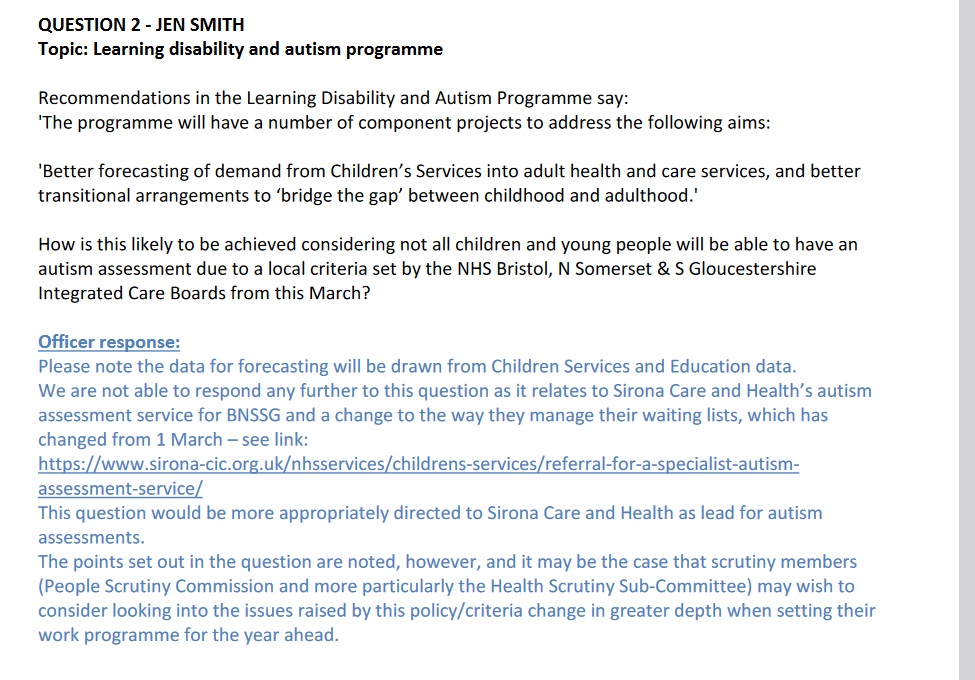
In response to a question at People Scrutiny Commission in March 2023 regarding changes to assessment criteria, officers said:
‘We are not able to respond any further to this question as it relates to Sirona Care and Health’s autism assessment service for BNSSG and a change to the way they manage their waiting lists, which has changed from 1 March – see link: https://www.sirona-cic.org.uk/nhsservices/childrens-services/referral-for-a-specialist-autism-assessment-service/
‘This question would be more appropriately directed to Sirona Care and Health as lead for autism assessments.
‘The points set out in the question are noted, however, and it may be the case that scrutiny members (People Scrutiny Commission and more particularly the Health Scrutiny Sub-Committee) may wish to consider looking into the issues raised by this policy/criteria change in greater depth when setting their work programme for the year ahead.’
Concern about the make up of ICBs in Bristol have already been raised by The Bristolian in February this year, even before the changes to the autism criteria were officially announced.
Bristol, North Somerset and South Gloucestershire Parent Carer Forums released a statement urging health services to reconsider the criteria.
They say: ‘Bristol, North Somerset and South Glos Parent Carer Forums collectively urge the services to reconsider this decision. We believe that a diagnosis is important for so many families and can be especially important for a child or young person’s identity and understanding of their neurodiversity. It is therefore imperative that support and diagnosis happen in tandem.’
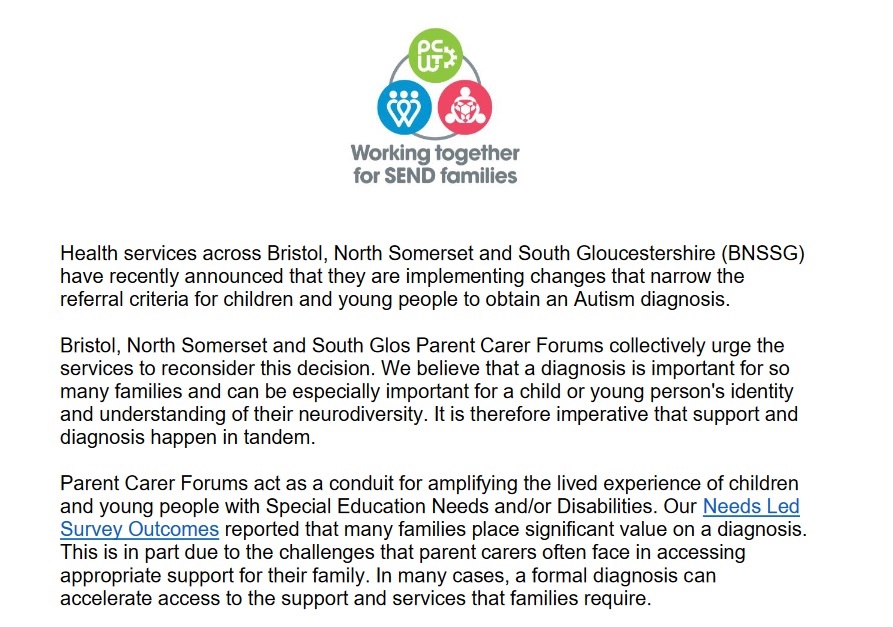
Sirona representatives attended a social communication and autism fayre in Weston Super Mare this week, fielding questions from concerned families and educationalists in the audience.
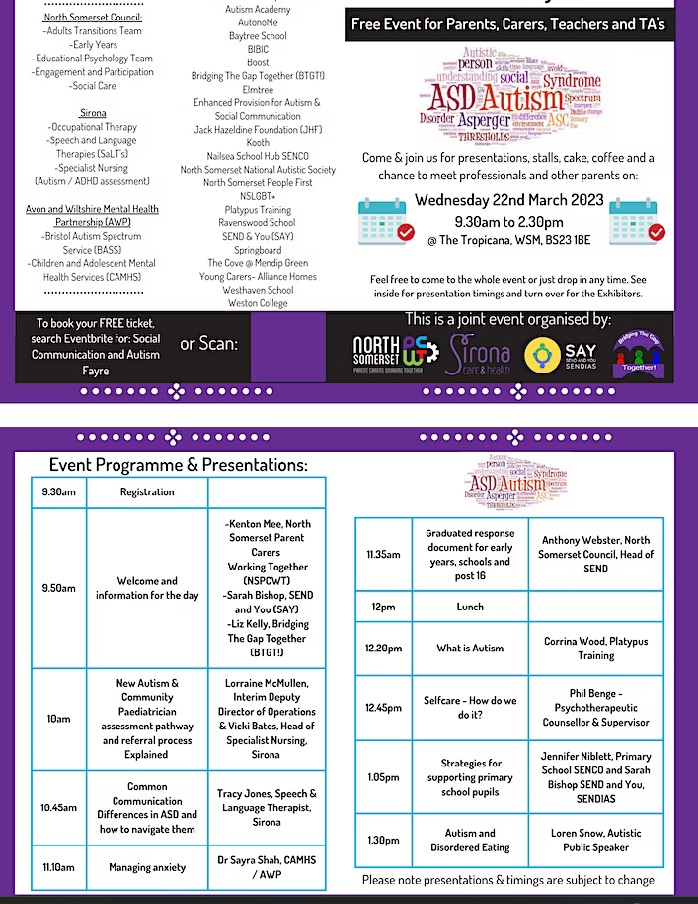
A Special Educational Needs Coordinator in attendance, shared a photograph of Sirona’s presentation showing huge numbers of children and young people waiting for an assessment. However, the service was only assessing 40 children and young people under 18 years of age per month.
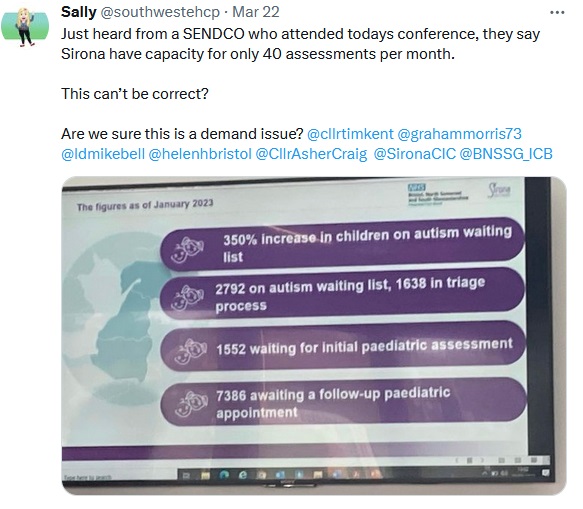
Sirona board meeting minutes chart the progress of the introduction of the autism assessment criteria.
A ‘demand-capacity toll’ and ‘projected flight plan’ was completed to reduce the number of children waiting for an autism assessment at the end of 2020.
In April 2022, additional support services were created for those waiting for an autism assessment or showing social communication difficulties (details discussed in February 2023 paperwork).
But at review in December 2022, Sirona said that waiting times ‘increased’ with families reporting a ‘detrimental impact’ on their children. Sirona said the volume of complaints and concerns they were receiving relating to waiting times was ‘increasing’.
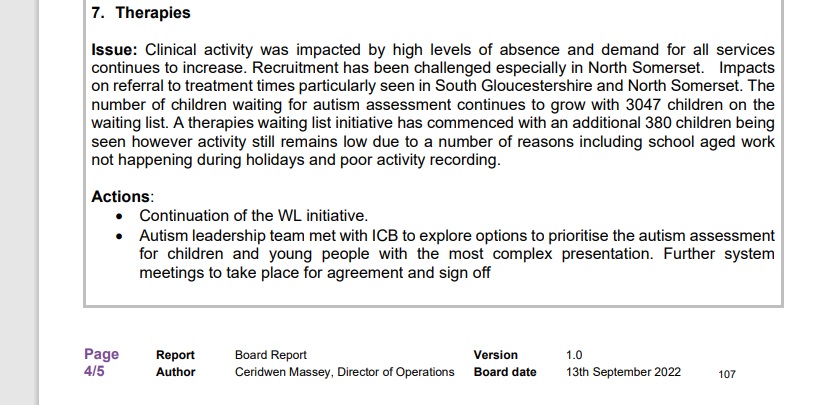
In September 2022, board papers showed there were recruitment challenges in North Somerset impacting on the number of children waiting for an autism assessment. However, Sirona noted that the waiting time for an autism assessment was growing, with 3047 children on the waiting list. There was actually more children waiting for an assessment last year than the 2792 who were waiting in January 2023.
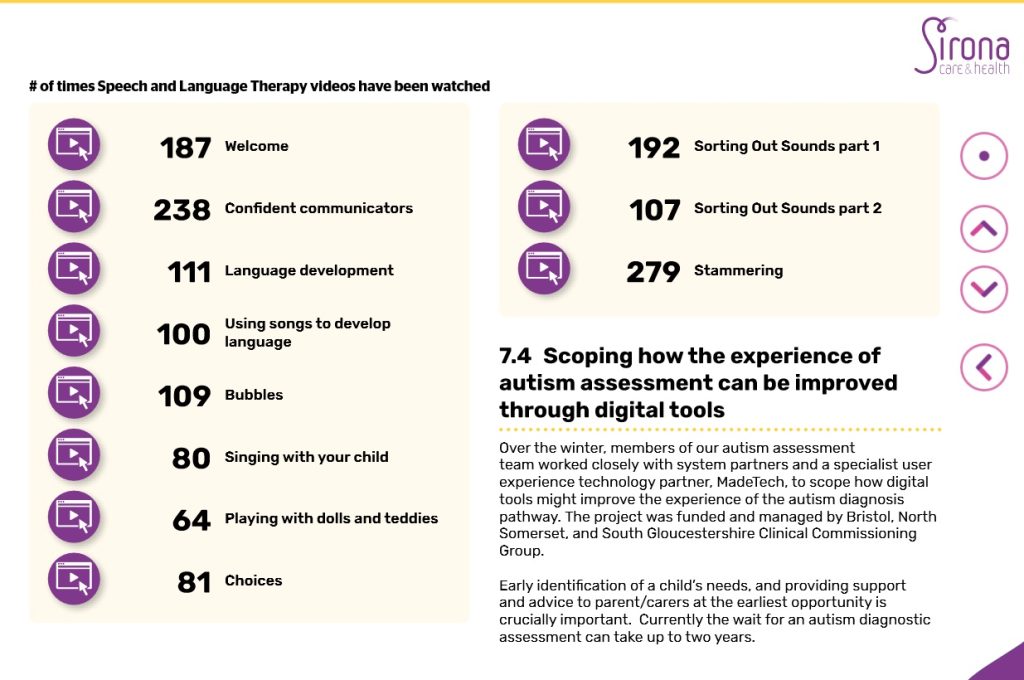
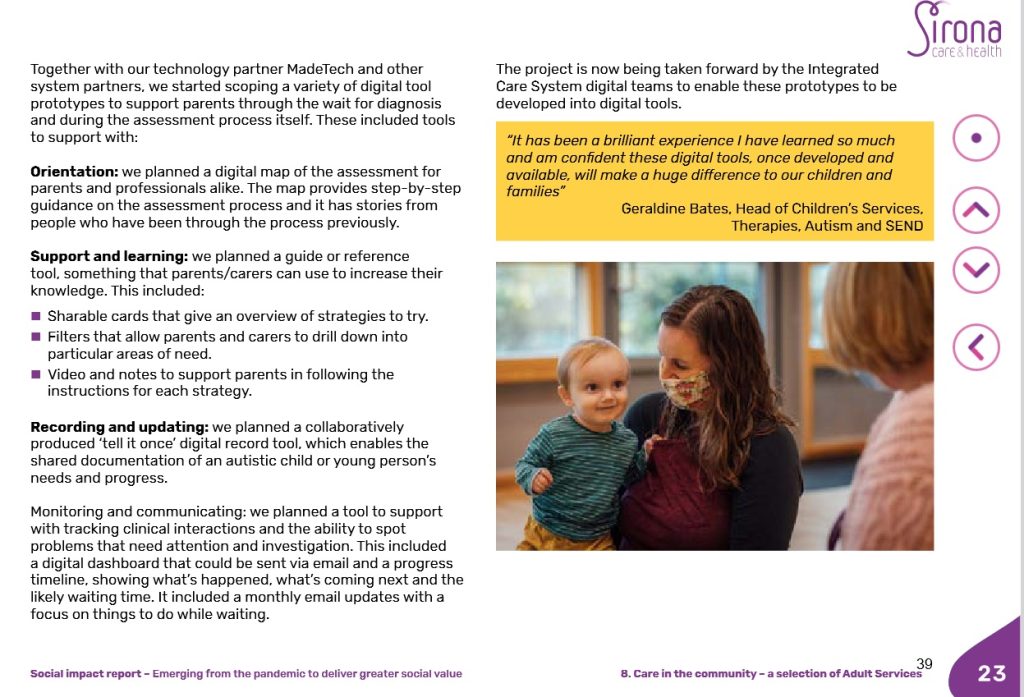
In November 2022, papers for Sirona’s Board meeting showed that the current wait for an autism assessment ‘can take up to two years’. Sirona were working with technology partner MadeTech to create digital tools to support families through the wait for a diagnosis.
Sirona wrote: ‘Early identification of a child’s needs, and providing support and advice to parent/carers at the earliest opportunity is crucially important.’
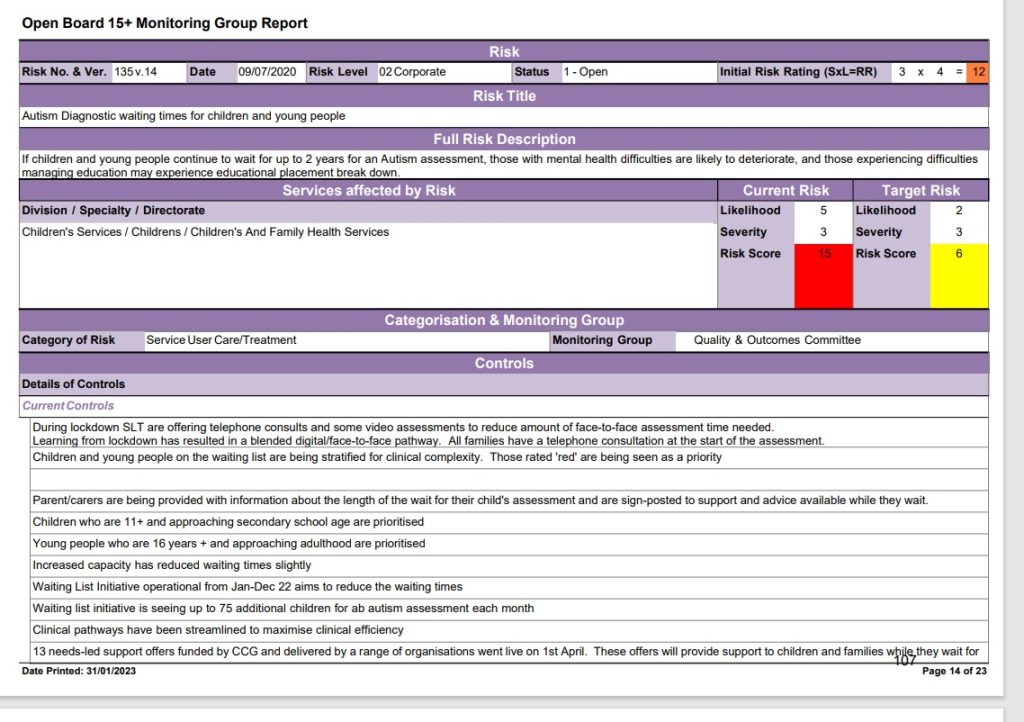
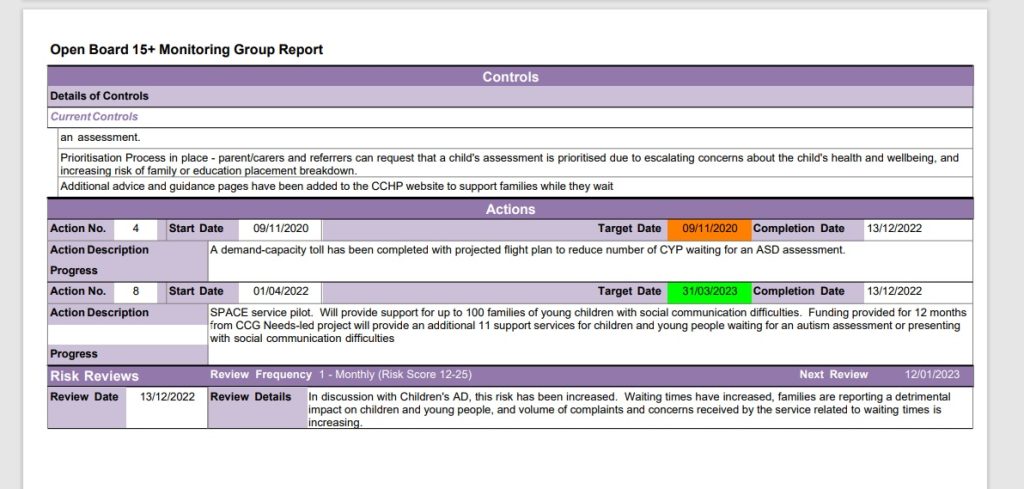
But by the February 2023 board meeting, papers said that children who may be seeking an autism or ADHD assessment can be waiting ‘as much as 3yr plus for an initial assessment.’
In a bid to tackle waiting lists, Sirona decided to approach commissioners to start ‘Neuro profiling’ to take referrals for children and young people with the ‘most complex cases.’
Papers say: ‘Autism – it was understood that Children with Autism or ADHD can be waiting as much as 3yr plus for initial assessment. Now looking at this as a system to address the wait time and it was acknowledged that work to begin in the new year. Funding to support tackling the waiting lists has been extended to end of June 2023. Sirona will look at taking those referrals with the most complex cases but need agreement from commissioners to undertake the Neuro profiling to assist with addressing the Waiting Lists.
‘Detailed action plans were shared with the committee to provide further assurance on the issues and concerns identified when reviewing data and preparing reports and the Committee acknowledged the efforts of the Children’s team in their approaches to collaborative partnership working to achieve better outcomes for those families using our services.’

A Neurodiversity (ND) Profiling Tool was rolled out across Plymouth in 2022 to support those on lengthy assessment waiting lists – which stood at 18 months. The tool replaced the referral process Though Plymouth says it does this to ‘help identify strategies’ to support the child or young person waiting as well as their families. It does ‘not affect their position on the waitlist’.
More Bristol News from Chopsy Bristol
Twitter: https://twitter.com/ChopsyBristol
YouTube: https://www.youtube.com/user/chopsybaby
Instagram: https://www.instagram.com/chopsybristol/
Facebook: https://www.facebook.com/chopsybristol
For Theatre News: https://backstagebristol.com
